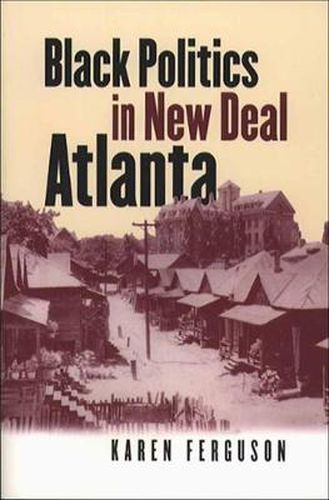Readings Newsletter
Become a Readings Member to make your shopping experience even easier.
Sign in or sign up for free!
You’re not far away from qualifying for FREE standard shipping within Australia
You’ve qualified for FREE standard shipping within Australia
The cart is loading…






When Franklin Roosevelt was elected president in 1932, Atlanta had the South’s largest population of college-educated African Americans. The dictates of Jim Crow meant that these men and women were almost entirely excluded from public life, but as Karen Ferguson demonstrates, Roosevelt’s New Deal opened unprecedented opportunities for black Atlantans struggling to achieve full citizenship.
Black reformers, often working within federal agencies as social workers and administrators, saw the inclusion of African Americans in New Deal social welfare programs as a chance to prepare black Atlantans to take their rightful place in the political and social mainstream. They also worked to build a constituency they could mobilize for civil rights, in the process facilitating a shift from elite reform to the mass mobilization that marked the postwar black freedom struggle.
Although these reformers’ efforts were an essential prelude to civil rights activism, Ferguson argues that they also had lasting negative repercussions, embedded as they were in the politics of respectability. By attempting to impose bourgeois behavioral standards on the black community, elite reformers stratified it into those they determined deserving to participate in federal social welfare programs and those they consigned to remain at the margins of civic life.
$9.00 standard shipping within Australia
FREE standard shipping within Australia for orders over $100.00
Express & International shipping calculated at checkout
When Franklin Roosevelt was elected president in 1932, Atlanta had the South’s largest population of college-educated African Americans. The dictates of Jim Crow meant that these men and women were almost entirely excluded from public life, but as Karen Ferguson demonstrates, Roosevelt’s New Deal opened unprecedented opportunities for black Atlantans struggling to achieve full citizenship.
Black reformers, often working within federal agencies as social workers and administrators, saw the inclusion of African Americans in New Deal social welfare programs as a chance to prepare black Atlantans to take their rightful place in the political and social mainstream. They also worked to build a constituency they could mobilize for civil rights, in the process facilitating a shift from elite reform to the mass mobilization that marked the postwar black freedom struggle.
Although these reformers’ efforts were an essential prelude to civil rights activism, Ferguson argues that they also had lasting negative repercussions, embedded as they were in the politics of respectability. By attempting to impose bourgeois behavioral standards on the black community, elite reformers stratified it into those they determined deserving to participate in federal social welfare programs and those they consigned to remain at the margins of civic life.